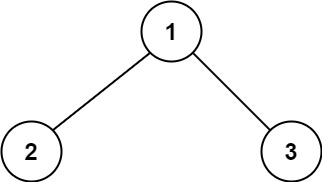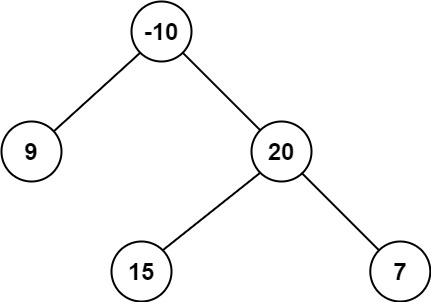LeetCode-in-All
124. Binary Tree Maximum Path Sum
Hard
A path in a binary tree is a sequence of nodes where each pair of adjacent nodes in the sequence has an edge connecting them. A node can only appear in the sequence at most once. Note that the path does not need to pass through the root.
The path sum of a path is the sum of the node’s values in the path.
Given the root of a binary tree, return the maximum path sum of any non-empty path.
Example 1:

Input: root = [1,2,3]
Output: 6
Explanation: The optimal path is 2 -> 1 -> 3 with a path sum of 2 + 1 + 3 = 6.
Example 2:

Input: root = [-10,9,20,null,null,15,7]
Output: 42
Explanation: The optimal path is 15 -> 20 -> 7 with a path sum of 15 + 20 + 7 = 42.
Constraints:
- The number of nodes in the tree is in the range
[1, 3 * 104]. -1000 <= Node.val <= 1000
Solution
%% Definition for a binary tree node.
%%
%% -record(tree_node, {val = 0 :: integer(),
%% left = null :: 'null' | #tree_node{},
%% right = null :: 'null' | #tree_node{}}).
-spec max_path_sum(Root :: #tree_node{} | null) -> integer().
max_path_sum(#tree_node{val = Val, left = null, right = null}) ->
Val;
max_path_sum(Root) ->
element(2, max_path(Root, -1001)).
-spec max_path(Node :: #tree_node{} | null, Max :: integer()) -> {integer(), integer()}.
max_path(null, Max) ->
{0, Max};
max_path(#tree_node{val = Val, left = Left, right = Right}, Max) ->
{LVal, LMax} = max_path(Left, Max),
{RVal, RMax} = max_path(Right, Max),
LocalMax = lists:max([LVal + Val, RVal + Val, Val]),
GlobalMax = lists:max([Max, Val, Val + LVal, Val + RVal, Val + LVal + RVal, LMax, RMax]),
{LocalMax, GlobalMax}.

